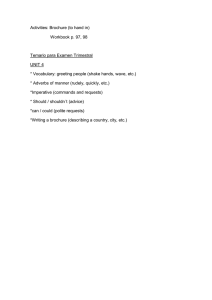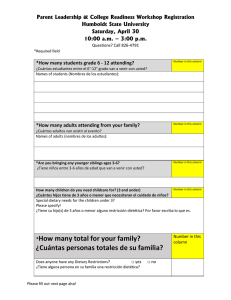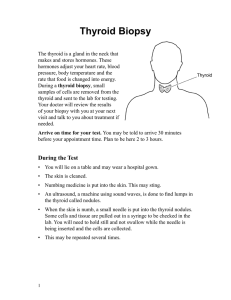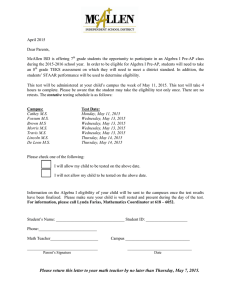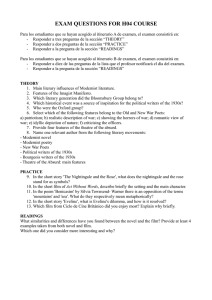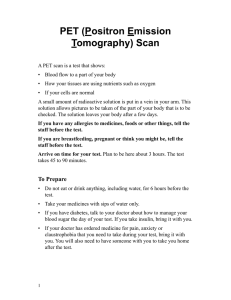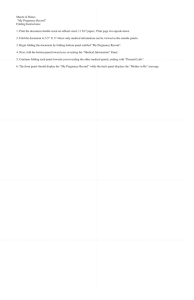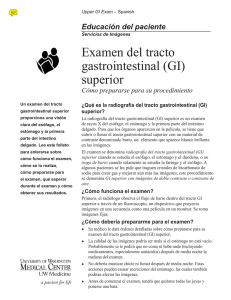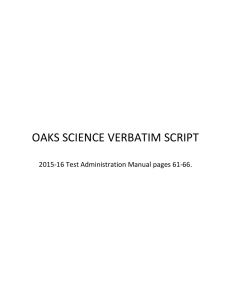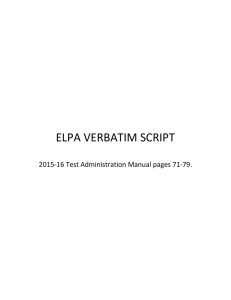MRI - Health Information Translations
Anuncio
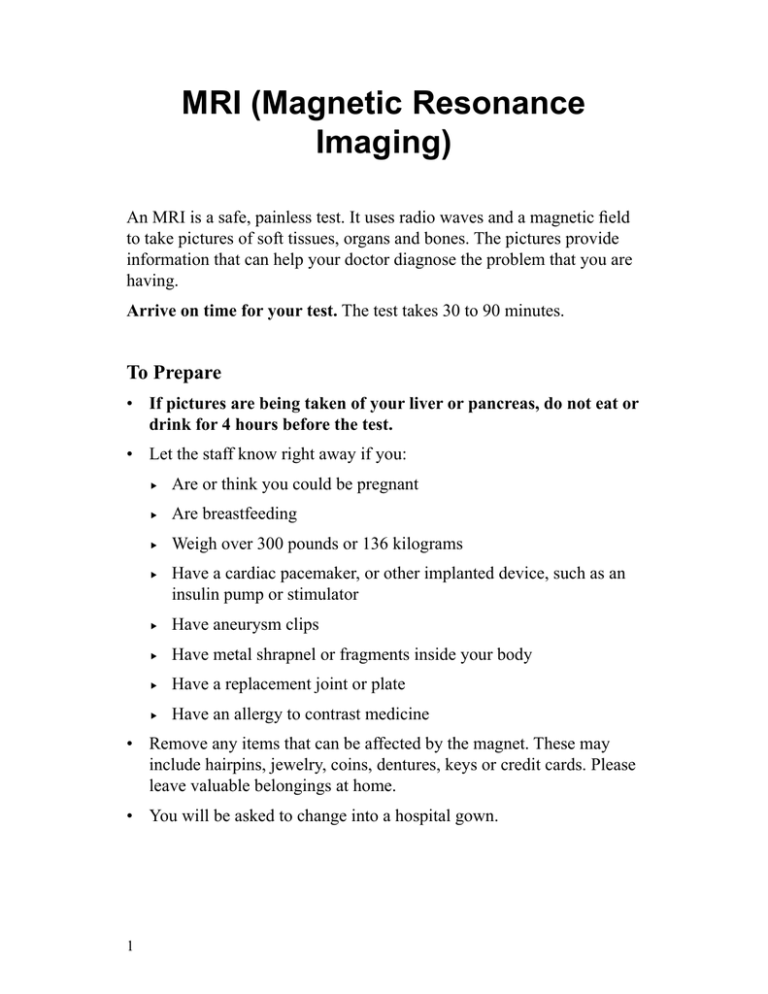
MRI (Magnetic Resonance Imaging) An MRI is a safe, painless test. It uses radio waves and a magnetic field to take pictures of soft tissues, organs and bones. The pictures provide information that can help your doctor diagnose the problem that you are having. Arrive on time for your test. The test takes 30 to 90 minutes. To Prepare • If pictures are being taken of your liver or pancreas, do not eat or drink for 4 hours before the test. • Let the staff know right away if you: ff Are or think you could be pregnant ff Are breastfeeding ff Weigh over 300 pounds or 136 kilograms ff Have a cardiac pacemaker, or other implanted device, such as an insulin pump or stimulator ff Have aneurysm clips ff Have metal shrapnel or fragments inside your body ff Have a replacement joint or plate ff Have an allergy to contrast medicine • Remove any items that can be affected by the magnet. These may include hairpins, jewelry, coins, dentures, keys or credit cards. Please leave valuable belongings at home. • You will be asked to change into a hospital gown. 1 Resonancia magnética (MRI) Una resonancia magnética (MRI por sus siglas en inglés) es un examen seguro e indoloro. Usa ondas de radio y un campo magnético para tomar imágenes de tejidos blandos, órganos y huesos. Las imágenes ofrecen información que puede ayudar a su médico a diagnosticar el problema que está teniendo. Llegue puntualmente a su examen. El examen dura entre 30 y 90 minutos. Preparación • Si se tomarán imágenes de su hígado o páncreas, no coma ni beba nada durante 4 horas antes del examen. • Informe al personal de inmediato si: ff está embarazada o cree que podría estarlo; ff está amamantando; ff pesa más de 300 libras o 136 kg; ff tiene un marcapasos cardíaco, u otro dispositivo implantado, como una bomba o estimulador de insulina; ff tiene clips para aneurismas; ff tiene metralla o fragmentos de metal dentro del cuerpo; ff tiene placa o prótesis articular; ff es alérgico al medicamento de contraste. • Quítese todos los artículos que puedan ser afectados por el imán. Estos pueden incluir horquillas para el cabello, joyas, monedas, dentaduras postizas, llaves o tarjetas de crédito. Deje los objetos de valor en su casa. • Se le pedirá que se ponga una bata de hospital. MRI. Spanish. 1 • You may have an IV (intravenous) put in your arm to give you contrast medicine during the test. • If being in a small space scares you, talk to your doctor before the test. Your doctor may order some medicine to help you relax. • You can eat, drink and take your medicines before the test. During the Test • You will lie on a table in the middle of a long tube-like machine. • The table slides into the opening of the machine until the part of your body to be checked is in the center. • If you are having a test of your head, you may need to wear a helmet. • Lie very still during the test. You may be asked to hold your breath for a few seconds during the test. • The machine may make a loud noise while pictures are taken. You may be given earplugs to wear. • You can talk to the staff through a speaker. Tell the staff if you need help or are uncomfortable. 2 • Es posible que se le coloque una vía intravenosa (IV) en el brazo para administrarle medicamento de contraste durante el examen. • Si tiene miedo de estar en espacios reducidos, hable con su médico antes del examen. Su médico puede ordenar algún medicamento para ayudarlo a relajarse. • Puede comer, beber y tomar sus medicamentos antes del examen. Durante el examen • Se recostará sobre una camilla en medio de una máquina larga con forma de tubo. • La camilla se desliza dentro de la abertura de la máquina hasta que la parte de su cuerpo que se analizará se encuentre en el centro. • Si se está realizando un examen de cabeza, es posible que deba usar un casco. • Permanezca acostado y quieto durante el examen. Se le puede pedir que contenga la respiración por algunos segundos durante el examen. • La máquina puede hacer un ruido fuerte mientras se toman las imágenes. Es posible que le den tapones para los oídos. • Puede hablar con el personal a través de un altavoz. Informe al personal si necesita ayuda o si está incómodo. MRI. Spanish. 2 After the Test • You may drive home after the test if you were not given medicine to help you relax during the test. If you were given medicine to help you relax, an adult must be with you to take you home. It is not safe for you to drive or leave alone. • If you were given contrast medicine during the test, drink 6 to 8 (8-ounce) glasses of liquid to flush the contrast out of your body. Good liquids to drink are water, milk and juice. Limit the amount of caffeine you drink such as coffee, tea and soft drinks. • Test results are sent to your doctor. Your doctor will share the results with you. Talk to the staff if you have any questions or concerns. 2005 – 1/2011 Health Information Translations Unless otherwise stated, user may print or download information from www.healthinfotranslations.org for personal, non-commercial use only. The medical information found on this website should not be used in place of a consultation with your doctor or other health care provider. You should always seek the advice of your doctor or other qualified health care provider before you start or stop any treatment or with any questions you may have about a medical condition. The Ohio State University Medical Center, Mount Carmel Health System, OhioHealth and Nationwide Children’s Hospital are not responsible for injuries or damages you may incur as a result of your stopping medical treatment or your failure to obtain medical treatment. 3 Después del examen • Puede conducir a su hogar después del examen si no se le administró ningún medicamento para ayudarlo a relajarse durante el mismo. Si se le dio un medicamento para ayudarlo a relajarse, debe haber un adulto con usted para llevarlo a su hogar. No es seguro que usted conduzca ni que se vaya solo. • Si se le dio una solución de contraste durante el examen, beba de 6 a 8 vasos (de 8 onzas [237 ml]) de líquido para eliminar el contraste de su cuerpo. Algunos líquidos que es bueno beber son agua, leche y jugo. Limite la cantidad de cafeína que bebe, como por ejemplo café, té y gaseosas. • Los resultados del examen se le envían a su médico, quien los analizará con usted. Hable con el personal si tiene alguna pregunta o duda. 2005 – 1/2011 Health Information Translations Unless otherwise stated, user may print or download information from www.healthinfotranslations.org for personal, non-commercial use only. The medical information found on this website should not be used in place of a consultation with your doctor or other health care provider. You should always seek the advice of your doctor or other qualified health care provider before you start or stop any treatment or with any questions you may have about a medical condition. The Ohio State University Medical Center, Mount Carmel Health System, OhioHealth and Nationwide Children’s Hospital are not responsible for injuries or damages you may incur as a result of your stopping medical treatment or your failure to obtain medical treatment. MRI. Spanish. 3
